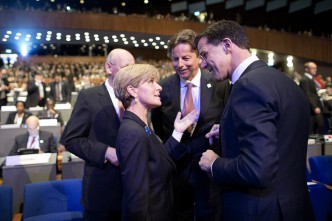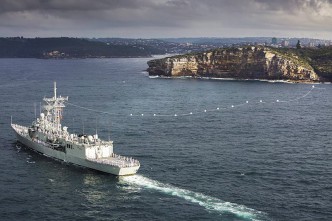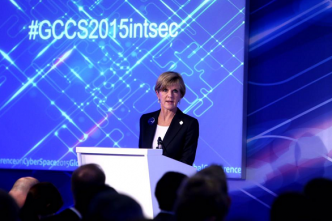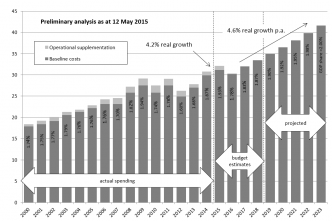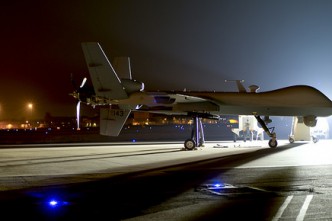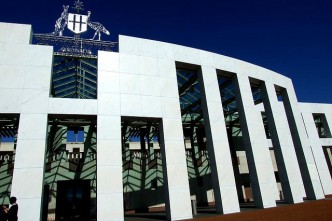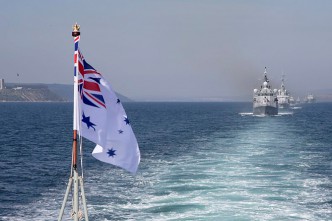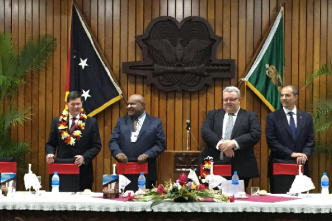The Beat Criminals uniting in drug trade The Crime Commission has revealed that criminal groups who would normally be enemies are putting their differences aside to reap the benefits of Australia’s lucrative drug trade. Cooperation …
The Government has announced an overall increase of $1.2bn over the next four years in national security spending. This new money comes in addition to the $1bn counter-terrorism and Iraq operations funding announced last year—and …
At the Global Conference on CyberSpace last month, Australia argued that the international landscape was too ‘premature’ for a comprehensive international agreement to govern international security in cyberspace. With disagreements over even the most basic …
As Joe Hockey rose to his feet in the House of Representatives to launch the Abbott Government’s second budget for 2015/16, shipbuilders in Melbourne were informed by BAE Systems that another 80 permanent skilled jobs …
David McDonough gave a stout defence of the Air Warfare Destroyer on this blog. In several respects it’s a superior platform to our existing fleet and some proposed alternatives—namely, the smaller, cheaper ships suggested by …
Russia and China are building on their long-held ‘uneasy friendship ’ with a new cybersecurity agreement. Under the deal, the two countries will jointly counteract technology that may ‘destabilize the internal political and socio-economic atmosphere,’ …
At first glance, the 2015 Budget was a very good one for Defence. Funding will grow to $32.1 billion next financial year, representing a 4.2% real year-on-year increase. And the much-heralded 2% of GDP target finally …
I was recently asked to give a lecture at ANU about the Revolution in Military Affairs (RMA). For those born after 1990—of which I encounter a distressingly large number in my professional life these days—RMA …
Malcolm Fraser, Australia’s 22nd Prime Minister, died in March 2015, at the age of 84. Fraser was Prime Minister from November 1975, to March 1983. This is part of ASPI’s new Strategic Insights paper, Reassessing Malcolm …
Sea State Japan is a serious contender to nab the SEA 1000 project, as news broke last week that the country is expected to provide Australia classified data on Soryu-class submarines. Previously, Japan has only …
Not since at least the end of the Cold War has it been so easy to paint a disturbing picture of the global strategic landscape. Ukraine’s sovereignty has been trashed by Russia. Large swaths of …
It’s budget week in Canberra. Politicians and influencers fly in to confab with stressed bureaucrats, complain about the cold and fog and watch autumn leaves falling faster than interest rates. At this time thoughts turn …
One of the topics at ASPI’s upcoming Army’s Future Force Structure Options Conference is ‘Land 400 and policy issues required for success’. A point of contention regarding LAND 400 Phase 2 is the estimated weight …
Every now and then a political earthquake shakes the land; an event that alters the frame of reference for years to come. Last week’s victory by British Conservative leader David Cameron is one such occasion. …
Dr Mark Thomson from the Australian Strategic Policy Institute has authored a paper on The Strategist, analysing the recently released RAND report titled ‘Australia’s Naval Shipbuilding Enterprise – Preparing for the 21st Century.’ This memo …
The Asia Pacific is going through a vivid and significant rule-making tussle. It’s unusual because rule-making and norm formation usually involve inching through decades. Power hierarchies tend to shift gradually and thus rules, by definition, …
To help you delve deeper into the world of strategy and international security, here are this week’s reading picks and podcasts. Kicking off with Australia, channel your inner defence nerd with all Canberra papers published by ANU’s Strategic …
The Defence White Paper, to be released later this year, will set out how Australia will respond to its future strategic environment and will outline a strategy for securing Australia’s strategic interests in the period …
Recent developments in Ukraine are raising serious concerns about the credibility and trustworthiness of the Russian Federation as a member of the international community. The annexation of Crimea in March 2014 and Russia’s role in …
Sir James Plimsoll was a strategist. While his illustrious foreign service career might suggest that he was more an implementer than a crafter of policy, those of us who were privileged to see him at …




